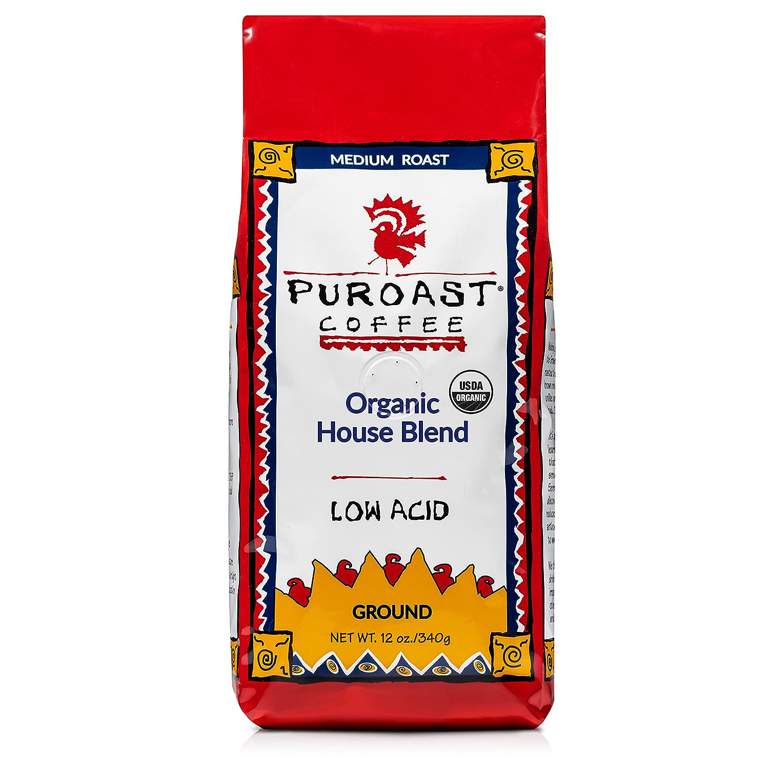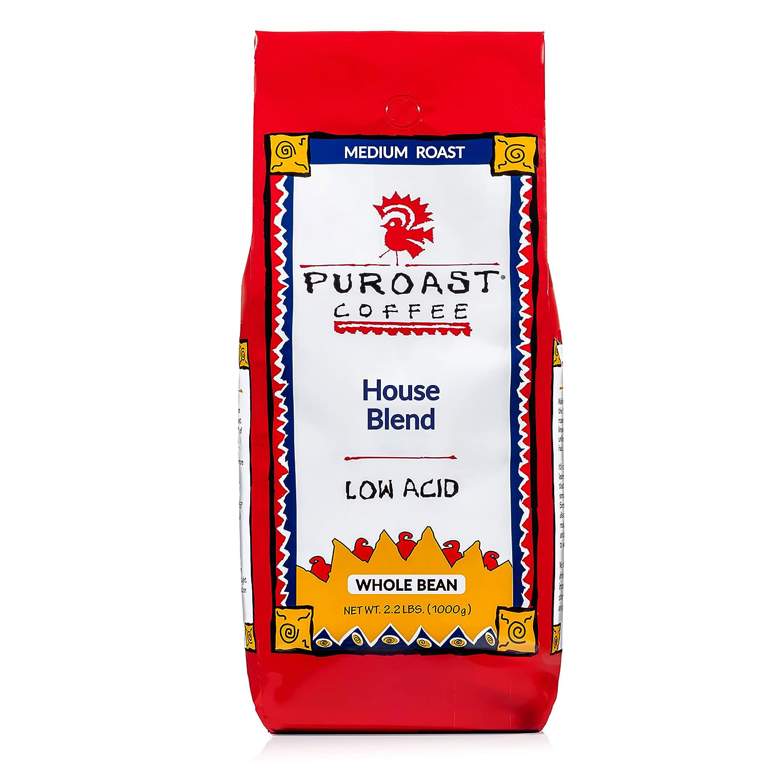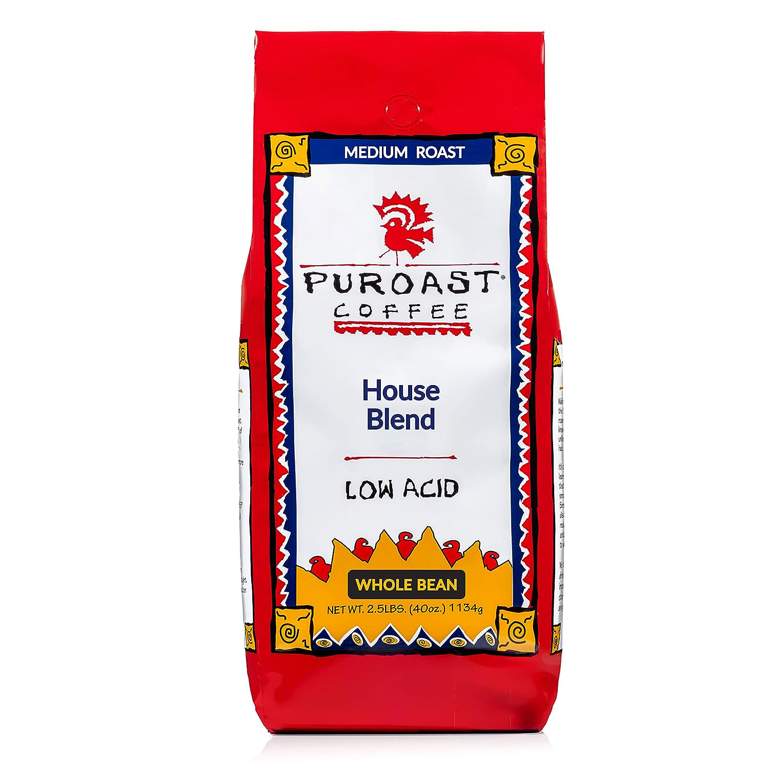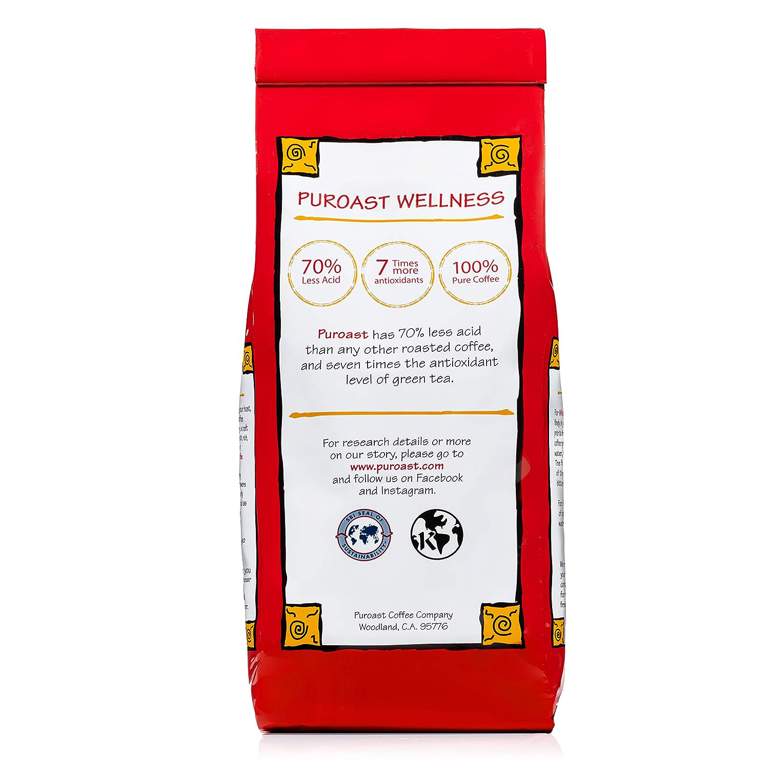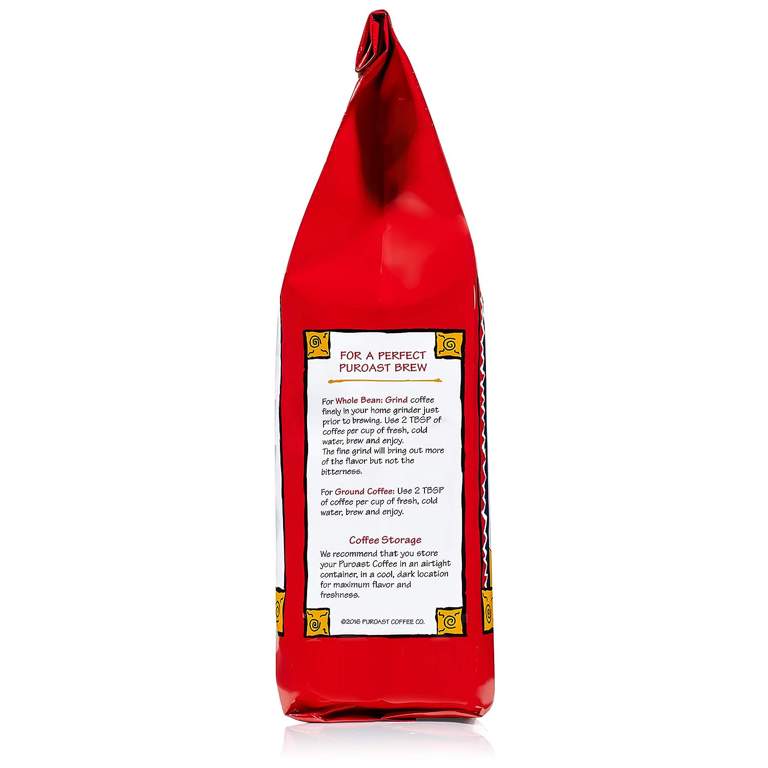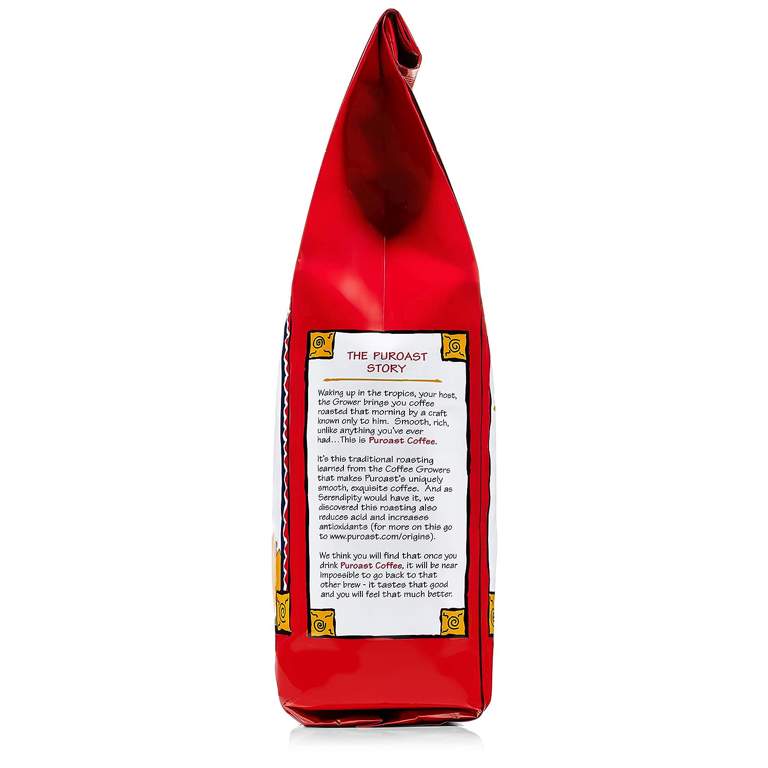Bestsellers for Health Benefits
Irritable Bowel Syndrome (IBS) is a common condition that affects the digestive system, causing symptoms like stomach cramps, bloating, diarrhea, and constipation. While there's no cure for IBS, understanding its triggers can help manage its uncomfortable effects. Among these potential triggers is coffee—a staple in many people’s daily routines—which may exacerbate symptoms for some individuals with IBS due to its acidity. However, not all coffees are created equal; low-acid options exist that might be more tolerable for those sensitive to traditional blends. As we explore the relationship between coffee and IBS further we'll delve into how you may be able to enjoy your beloved brew without compromising your comfort or health.
What is IBS?
 It involves symptoms such as abdominal pain, bloating, and changes in bowel habits including constipation and diarrhea. The condition affects between 10% to 15% of the population in North America and Europe according to studies.
It involves symptoms such as abdominal pain, bloating, and changes in bowel habits including constipation and diarrhea. The condition affects between 10% to 15% of the population in North America and Europe according to studies.
IBS is diagnosed based on criteria that include recurrent abdominal pain or discomfort for at least three months. This pain must be associated with two or more of the following: relief after defecation, onset associated with a change in frequency of stool, or onset associated with a change in form (appearance) of stool.
There are different subtypes of IBS which are categorized based on the predominant symptom—constipation (IBS-C), diarrhea (IBS-D), mixed (IBS-M), where both constipation and diarrhea occur, and unclassified IBS which does not fit into the other categories.
Diet plays a significant role in managing IBS symptoms. Certain foods can trigger flare-ups; hence individuals may need to modify their diet to reduce these triggers.
Coffee consumption has been identified as one potential dietary trigger for some people with IBS due to its acidity level. High-acid coffees can irritate the digestive system leading to increased discomfort for those with sensitive guts.
Low-acid coffee options provide an alternative that may be better tolerated by individuals with IBS. These coffees have less acid compared to traditional blends which could mean fewer stomach issues for those affected by high acidity levels.
Puroast offers low-acid coffee products that aim to deliver quality taste without unnecessary discomfort for consumers who might be sensitive due to conditions like IBS.
What Are The Symptoms of IBS?
 The most common symptoms include abdominal pain, which is typically the central feature of IBS. This pain may come and go and is frequently relieved by having a bowel movement.
The most common symptoms include abdominal pain, which is typically the central feature of IBS. This pain may come and go and is frequently relieved by having a bowel movement.
Bloating and swelling are also prevalent among those with IBS, causing discomfort and sometimes an increase in waist size. Gases or flatulence often accompany bloating, adding to the distress.
Changes in bowel habits are another key symptom of IBS. Some individuals may suffer from constipation (IBS-C), characterized by infrequent stools that may be hard or difficult to pass. Others might experience diarrhea (IBS-D), where they have loose, watery stools more frequently.
A mixed pattern of constipation and diarrhea (IBS-M) can occur as well, making it challenging for sufferers to predict their bowel movements. Additionally, some people report contractions within the intestines.
Nausea and vomiting are less common but still possible symptoms associated with IBS. These can contribute to an overall feeling of being unwell.
Symptoms such as these tend not to be constant; they can fluctuate over time—some days might be better than others—and they often worsen during periods of stress or after eating certain foods.
For those who enjoy coffee but find it triggers their IBS symptoms due to its acidity level, Puroast provides low-acid coffee options designed to offer a smoother cup without sacrificing taste or quality—potentially reducing gastrointestinal discomfort for consumers with sensitive digestive systems.
Is There a Cure for IBS?
 Treatment focuses on managing symptoms and improving quality of life. A variety of approaches are used to alleviate the discomfort associated with IBS, including dietary changes, medication, and stress management.
Treatment focuses on managing symptoms and improving quality of life. A variety of approaches are used to alleviate the discomfort associated with IBS, including dietary changes, medication, and stress management.
Dietary modification is one of the most common interventions for IBS relief. Many patients find that avoiding certain foods can reduce their symptoms significantly. Fiber supplementation has traditionally been recommended, although its effectiveness varies among individuals.
Medical professionals often suggest increasing fiber intake to help with IBS-C or decreasing carbohydrates in cases where IBS-D predominates. These recommendations aim to normalize bowel habits and reduce abdominal pain.
Around 70% of healthcare providers believe that dietary changes can improve IBS symptoms. Similarly, adjustments in diet are thought to benefit chronic disease symptoms as well.
However, some individuals may risk nutritional deficiencies if they exclude too many foods from their diet without proper guidance. Those with IBS need to seek advice from healthcare professionals before changing their diet.
Low-acid coffee options have emerged as an alternative for people who experience exacerbated IBS symptoms due to the high acidity found in regular coffee blends. These products offer a way for coffee enthusiasts with sensitive stomachs to enjoy their beverage without aggravating their condition.
Puroast provides low-acid coffee that aligns with these needs by offering at least 50% less acid than traditional coffees without any additives—supporting those with digestive sensitivities while delivering a rich flavor profile expected from a premium cup of coffee.
What Are Common IBS Triggers?
 Identifying these triggers is a key step in managing the condition effectively. Common dietary triggers include:
Identifying these triggers is a key step in managing the condition effectively. Common dietary triggers include:
Dairy products, such as milk and cheese, may cause bloating and gas.
Wheat products, which contain gluten can lead to discomfort for some people with IBS.
Caffeinated drinks like coffee and tea; caffeine can stimulate the digestive system and exacerbate symptoms.
Certain vegetables including cabbage, onions, peas, and beans are known to cause gas and bloating.
Spicy foods may irritate the gut lining leading to pain or diarrhea.
Fried and smoked foods are harder to digest, potentially causing stomach upset.
In addition to food items, lifestyle factors such as stress have been linked with symptom flare-ups in IBS patients. Individuals with IBS need to monitor their reactions to different foods and adjust their diet accordingly.
For those who enjoy coffee but notice it triggers their symptoms due to its acidity level or caffeine content, low-acid options might be more suitable. These alternatives provide a way for coffee lovers with sensitive digestive systems to continue enjoying their favorite beverage without aggravating their condition.
Puroast offers a selection of low-acid coffees designed specifically for consumers looking for gentler options on the stomach while still delivering rich flavor profiles expected from high-quality coffee.
How to Tell If Coffee is an IBS Trigger
 If you notice an increase in IBS symptoms such as abdominal pain, bloating, or changes in bowel habits following coffee consumption, this could indicate that coffee is a trigger. Here are steps to help identify if coffee affects your IBS:
If you notice an increase in IBS symptoms such as abdominal pain, bloating, or changes in bowel habits following coffee consumption, this could indicate that coffee is a trigger. Here are steps to help identify if coffee affects your IBS:
Keep a food diary: Record what you eat and drink along with any symptoms you experience.
Note the timing: Track when symptoms occur when consuming coffee.
Experiment with elimination: Try removing coffee or switching to low-acid and/or decaf options for a while. Observe any changes in symptoms.
Reintroduce carefully: Slowly reintroduce coffee and monitor for symptom recurrence.
Assess the type of coffee: Consider whether high-acid coffees cause more issues than low-acid options.
Monitor portion sizes: Large amounts of caffeine may be more likely to trigger symptoms than smaller servings.
Research suggests that while some individuals with IBS might not find their condition worsened by regular or caffeinated coffees, others may experience increased odds of constipation-predominant IBS (IBS-C) with higher intake levels.
For those who identify regular or high-caffeine coffees as triggers but still want to enjoy their daily brew, Puroast offers low-acid alternatives that provide at least 50% less acid compared to traditional blends without additives—potentially offering relief from gastrointestinal discomfort associated with sensitive digestive systems due to conditions like IBS while maintaining rich flavor profiles expected from premium quality coffee.
Can Coffee Lower My Risk of IBS?
 The relationship between coffee consumption and Irritable Bowel Syndrome (IBS) symptoms is complex, with studies showing varying results. While some individuals with IBS may experience an increase in symptoms such as constipation when consuming coffee, others might find that moderate coffee intake can actually improve their digestive health.
The relationship between coffee consumption and Irritable Bowel Syndrome (IBS) symptoms is complex, with studies showing varying results. While some individuals with IBS may experience an increase in symptoms such as constipation when consuming coffee, others might find that moderate coffee intake can actually improve their digestive health.
Research indicates that for certain people living with IBS, particularly those who do not have severe forms of the condition, coffee does not significantly worsen their symptoms. The ritual of a warm beverage in the morning could potentially aid in regular bowel movements for some individuals. This gentle stimulation can be especially beneficial for those dealing with IBS-related constipation.
It's also worth noting that while caffeine is often cited as a potential irritant for sensitive digestive systems, it has been shown to possess mild laxative properties which may help alleviate constipation—one of the primary symptoms associated with constipation-predominant IBS (IBS-C). However, this effect varies from person to person and should be approached cautiously.
For those who enjoy coffee but are concerned about its acidity or caffeine content possibly triggering their IBS symptoms, Puroast offers a thoughtful solution. Our low-acid coffees are designed to deliver at least 50% less acid than standard blends without compromising on flavor. This reduction in acidity means our coffees are gentler on the stomach and may be better tolerated by those with sensitive gastrointestinal tracts—providing them an opportunity to savor a delicious cup of coffee while managing their digestive wellness.
In summary, while there isn't conclusive evidence suggesting that coffee lowers the risk of developing IBS or improves its symptoms universally, many individuals find they can still enjoy this beloved beverage by choosing options like Puroast's low-acid varieties which cater specifically to sensitive stomachs and aim to minimize discomfort related to digestion issues.
Can I Drink Coffee if I Have IBS?
 The answer isn't straightforward as it depends on your sensitivity to coffee's components, like acidity and caffeine. Here are some considerations for those with IBS who wish to drink coffee:
The answer isn't straightforward as it depends on your sensitivity to coffee's components, like acidity and caffeine. Here are some considerations for those with IBS who wish to drink coffee:
Acidity: Coffee's natural acidity can irritate the digestive tract. If regular coffee causes discomfort, low-acid options may be more suitable.
Caffeine: It stimulates the gut and can lead to increased motility, which might worsen symptoms in some people with IBS.
Individual response: Pay attention to how your body reacts after drinking coffee. Some people with IBS may tolerate it well while others do not.
To minimize potential negative effects of drinking coffee when you have IBS:
Start with small amounts: Begin by consuming a smaller quantity of coffee and observe how your body responds.
Choose low-acid varieties: These coffees are less likely to irritate the stomach and intestines.
Choose decaffeinated varieties: Reducing your caffeine consumption may improve symptoms
Avoid additives: Creamers or sweeteners could also trigger symptoms; consider having black or minimally sweetened coffee instead.
Overcoming IBS Is Possible
For many, coffee is a potential irritant due to its acidity and caffeine content. However, overcoming IBS doesn't always mean you have to give up coffee entirely.
Low-acid coffee is an alternative that may be more tolerable for those with IBS. It has less acid compared to traditional blends, which can reduce irritation in the stomach and intestines. This type of coffee might help prevent the discomfort associated with high-acid beverages.
When considering low-acid coffee as part of your diet:
Consult healthcare professionals: They can guide managing IBS through diet.
Try different types: Not all low-acid coffees are the same; find one that suits your taste and digestive needs.
Monitor symptoms: Keep track of any changes in your condition when drinking low-acid coffee.
Research supports dietary modification as a key strategy for alleviating IBS symptoms:
Around 70% of healthcare providers believe changing diet improves IBS symptoms.
Fiber intake adjustments are commonly recommended based on individual needs.
Some people with IBS may risk nutritional deficiencies if they exclude too many foods without proper advice.
Puroast offers a selection of low-acid coffees designed for consumers who want gentler options on their stomachs while still enjoying the rich flavor profiles expected from high-quality coffee. These products contain at least 50% less acid than standard coffees without additives—potentially offering relief from gastrointestinal discomfort associated with sensitive digestive systems due to conditions like IBS.
FAQ
What is the main cause of IBS?
The exact cause of IBS is not fully understood, but it is believed to be due to a combination of factors including changes in the GI tract's motility, increased sensitivity to pain from the gut, imbalances in gut bacteria, infections, and neurotransmitter imbalances. Genetic factors and stress are also considered potential contributors.
How can I get diagnosed with IBS?
Diagnosis typically involves a physical examination, review of symptoms, and medical history. Criteria such as the Rome IV criteria, used by doctors, are often used to identify IBS by ruling out other conditions. In some cases, tests may be performed to exclude other diseases, such as blood tests, stool tests, and colonoscopy.
Are there any lifestyle changes that can help with IBS management?
Yes, regular exercise, adequate sleep, stress reduction techniques, and hydration can all contribute to better IBS management. Eating smaller and more frequent meals may also help ease symptoms.
Is IBS considered a serious condition?
While IBS can significantly affect quality of life, it is not usually considered life-threatening. It does not cause changes in bowel tissue or increase the risk of colorectal cancer like some other, more serious bowel conditions. If you have questions about IBS or your gut-health, speak with a doctor.
Are there specific types of exercise recommended for people with IBS?
Low-impact exercises such as walking, cycling, swimming, and yoga can be beneficial for those with IBS. These activities can help reduce stress and promote normal contractions of the bowels.
Can children get IBS?
Yes, children can develop IBS. Symptoms are similar to those in adults, and management involves lifestyle changes, dietary adjustments, and in some cases, medication.
Is IBS more common in men or women?
IBS is more commonly reported in women than in men. Hormonal changes may play a role in these statistics, as some women experience increased IBS symptoms during menstruation.
How might IBS affect my mental health?
IBS can impact mental health by increasing levels of stress, anxiety, and depression. Conversely, these mental health issues can also worsen IBS symptoms, creating a cycle that needs to be addressed in treatment.
Can probiotics help alleviate IBS symptoms?
Probiotics may help manage IBS by improving the balance of gut bacteria. However, responses can vary from person to person, and consulting with a healthcare provider is recommended before starting any probiotic regimen.
Are there any complications associated with IBS?
While IBS itself does not usually lead to serious medical conditions, chronic symptoms can lead to complications like hemorrhoids, which result from straining during bowel movements, or malnutrition from dietary restrictions.
What is the connection between FODMAPs and IBS?
FODMAPs (fermentable oligosaccharides, disaccharides, monosaccharides, and polyols) are certain types of carbohydrates that are difficult for some people to digest and can worsen IBS symptoms. Following a low-FODMAP diet may help identify which foods trigger IBS symptoms.
Can IBS cause other digestive diseases?
IBS does not cause other digestive diseases; however, it can coexist with conditions like gastroesophageal reflux disease (GERD) or lactose intolerance, which can compound digestive discomfort.
Do stress and anxiety trigger IBS?
Stress and anxiety do not cause IBS, but they can trigger or worsen symptoms. Managing stress can help control IBS flares.
How does IBS affect daily life?
IBS can impact daily activities, work, and social interactions due to unpredictable bowel movements, pain, and the need for immediate access to a bathroom. Strategies and treatments for managing IBS can help individuals maintain a better quality of life.
Is there a recommended diet for IBS?
While there is no one-size-fits-all diet for IBS, a balanced diet that avoids trigger foods is recommended. Some individuals benefit from trying a low-FODMAP diet under professional guidance. It is important to ensure nutritional needs are still being met while making dietary adjustments. Speak to your doctor to better understand what diet could be right for you.
Puroast does not provide medical advice, diagnosis, or treatment. Any information published on this website or by this company is not intended as medical advice. Always consult a qualified health or mental health professional with any questions or concerns about your physical or mental health.
Puroast Buying Guide

When it comes to choosing a coffee that is gentle on your digestion, there are a few key factors to consider. First and foremost, look for a coffee that boasts low acidity. This will help reduce the risk of heartburn, acid reflux, and other gastrointestinal issues. Puroast Low Acid Coffee House Blend is an excellent option in this regard, with its 70% less acid compared to regular coffee.
Another important aspect to consider is the antioxidant content of the coffee. Antioxidants play a crucial role in promoting overall health and well-being. Puroast coffee stands out in this area, with its 7x higher antioxidant levels than green tea and 5x higher than leading coffee brands. These antioxidants can help combat free radicals in the body and provide numerous health benefits.
In addition to low acidity and high antioxidants, it's also essential to choose a coffee that is sustainably sourced and free from chemicals and pesticides. Puroast takes pride in its commitment to quality and sustainability, sourcing their high elevation grown coffee beans from sustainable farms and ensuring they are kosher and chemical/pesticide-free.
Lastly, consider the taste and aroma of the coffee. While the primary focus may be on its health benefits, it's equally important to enjoy the flavor of your coffee. Puroast's unique roasting method creates a smooth and aromatic cup of coffee that won't leave a bitter aftertaste, making it a delightful choice for coffee enthusiasts.
In conclusion, when shopping for a coffee that is good for your digestion, prioritize low acidity, high antioxidants, sustainable sourcing, and great taste. Puroast Low Acid Coffee House Blend checks all these boxes, making it an excellent choice for those seeking relief from coffee-related digestive issues while still enjoying a flavorful cup of joe. Here are some products we recommend.
Puroast Low Acid Coffee Ground, Organic House Blend, Medium Roast, Certified Low Acid Coffee, pH 5.5+, Gut Health, 12 oz, Higher Antioxidant, Smooth for Espresso, Iced Coffee
Puroast Low Acid Coffee is a delicious brew with 70% less acid than regular coffee, 7X the antioxidants of green tea and no bitter aftertaste. It's sustainably sourced, chemical/pesticide free, and made using renewable, clean technology. Enjoy the smooth and aromatic cup of coffee without any digestive issues!
- Low acid content makes Puroast Coffee perfect for those with sensitive stomachs or acid reflux issues.
- The coffee boasts a higher antioxidant level, offering potential health benefits.
- Certified as organic, ensuring a natural and chemical-free product.
- The medium roast brings out a balanced flavor, not too bitter or too light.
- Puroast Coffee is great for making a variety of drinks like espresso and iced coffee.
- With a pH of 5.5+, this coffee promotes gut health.
- Customers love the smooth taste of this house blend.
Puroast Low Acid House Blend Single Cup Coffee, 96 cups
Puroast Low Acid House Blend Single Cup Coffee is a fantastic choice for those looking for symptom relief from heartburn, acid reflux, and other stomach problems. It is produced using a proprietary roasting technology that reduces acidity by 70%, provides delicious flavor, and contains 7 times more antioxidants than green tea. With 96 cups included in the package, it is an excellent value for the price.
- Coffee has an excellent taste
- Better on the stomach due to low acidity
- Ideal for people with sensitive stomachs
- Offers the best of both worlds - taste and low acidity
- Can be enjoyed as a second cup of coffee at work
- Despite being pricey, it's considered worth the cost
- It's the only acceptable coffee for some due to its low acidity
Puroast Low Acid Whole Bean Coffee, Premium House Blend, High Antioxidant, Caffeinated, 2.2 Pound Bag, 1000 Gram
Size Guide
Amazon - 2.2LB
Puroast Direct - 2.5LB
Description
Puroast Low Acid Whole Bean Coffee is perfect for those with heartburn or acid reflux, as it has 70% less acid than other coffees. It also contains 7x higher antioxidants than green tea and 5x higher antioxidants than leading coffee brands. Their unique roasting method creates a low-acid blend that won't upset your stomach, and they use renewable clean technology for their roasters. Additionally, the coffee is sustainably sourced, kosher, and chemical/pesticide free.
- Customers love the low acid content of Puroast Coffee, making it a great choice for those with sensitive stomachs or acid reflux.
- Many reviews mention the high antioxidant level as a significant health benefit.
- The Premium House Blend is highly praised for its rich and smooth flavor.
- Users appreciate that it's a caffeinated coffee, providing them with the needed energy boost in the morning.
- The large 2.2-pound, or 1000 gram bag, offers excellent value for money, according to many reviews.
- It is a whole bean coffee, allowing for fresh grinding and optimal flavor retention.
- Many customers are repeat buyers, indicating high satisfaction with the overall quality and taste of this product.




